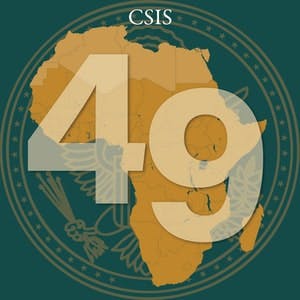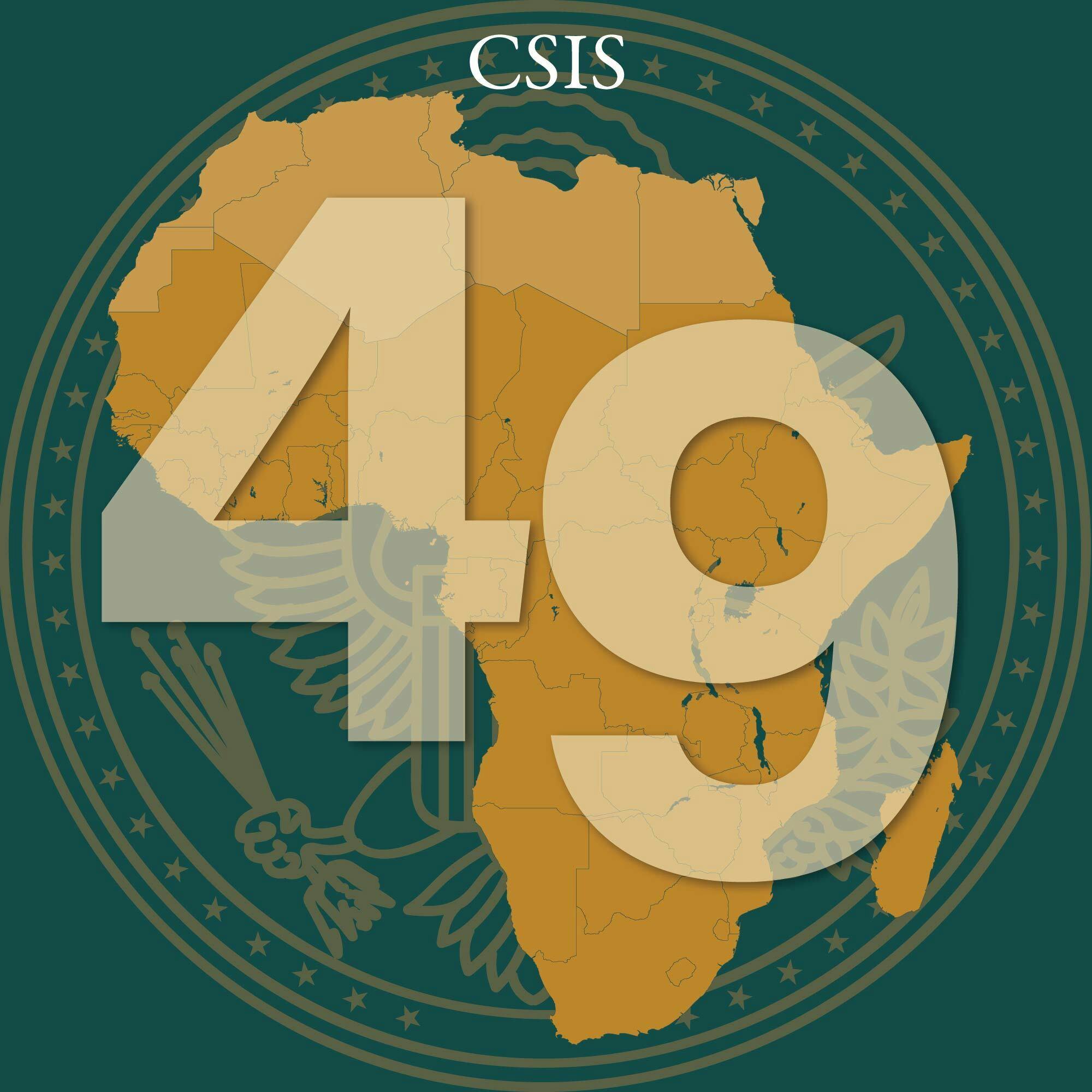Discover 49
49

49
Author: Center for Strategic and International Studies
Subscribed: 42Played: 303Subscribe
Share
© 2021 Center for Strategic and International Studies
Description
What is the past, present, and future of U.S. policy towards sub-Saharan Africa? Judd Devermont, Director of the Africa Program at the Center for Strategic and International Studies (CSIS), and Nicole Wilett, Chief of Staff at the Open Society Foundations, sit down with diplomats, journalists, civil society activists, and academics to discuss policy recommendations for the Biden Administration. In 15 minutes or less, these episodes deliver the goods on U.S. relations with African countries, as well as share the best of African music, food, dance, film, and travel.
37 Episodes
Reverse
Ambassador Cynthia Akuetteh joins Judd and Nicole to explore what a reimagined U.S. policy toward São Tomé and Príncipe might look like. Ambassador Akuetteh argues that the Central African island state should be at the center of Biden’s climate strategy toward the region, as well as the recipient of additional Millennium Challenge Corporation (MCC) compacts. She also calls on Washington to operate an embassy in the country. Plus, what makes São Tomé’s chocolate so uniquely delectable.
Ken Opalo (Georgetown University) joins Judd and Nicole to discuss what the Biden administration strategy should be toward Kenya, recommending “trade, trade, and more trade.” He suggests that the Biden administration think beyond the bilateral U.S.-Kenya Free Trade Agreement (FTA) floated under the Trump administration and consider a regional trade agreement with the East African Community (EAC) that fits within the continent-wide African Continental Free Trade Area (AfCFTA) Agreement. Plus, we hear about the future of Kenyan athletic excellence beyond running: Kenyan rugby!
Judd and Nicole are joined by Ambassador Cynthia Akuetteh to discuss U.S.-Gabon relations, including why the Biden administration should support Gabon on its climate goals and anti-logging efforts, as well as engage the government and civil society groups to ensure a peaceful election in 2023. Plus, we hear a clip from President Bongo’s 1977 funk album, “Brand New Man”.
Judd and Nicole are joined by Jérôme Tubiana to discuss U.S.-Chad relations. They talk about Washington’s disregard of Chad’s democracy challenges in favor of the counter-terrorism relationship, and why it's critical that the United States support a transition to civilian rule following the April 2021 death of Idriss Déby. Plus, Jérôme describes his month-long visit to the Tibesti Mountains, a volcanic mountain range in northern Chad.
Judd and Nicole are joined by Ambassador Laurence Wohlers (Youth for Understanding) to discuss the history of U.S. policy toward Central African Republic (CAR). They explore Washington’s episodic engagement with the land-locked nation and why the international community should focus on outcomes, not just process. Plus, Ambassador Wohlers describes the history of coexistence between CAR’s ethnic groups and the country’s "imported” ethnic tension.
Carine Kaneza Nantulya (Human Rights Watch) joins Judd and Nicole to discuss U.S.-Burundi relations and why the Biden administration should engage on human rights and democracy issues to ensure Burundi’s next elections are free, fair, and transparent. Plus, why Burundian royal drummers—accompanied by Jennifer Hudson—should be incorporated into the next state visit to Washington, D.C.
Judd and Nicole are joined by Christopher Fomunyoh (National Democratic Institute) to talk U.S. policy toward Cameroon. They discuss how the Biden administration should approach the country’s Anglophone crisis—including by appointing an envoy—and why Washington should implement its own strategy toward Cameroon while working with France and Central African states on a shared strategy to address ongoing challenges. Plus, why Cameroon is known as “Africa in miniature.”
Mvemba Dizolele (CSIS) joins Judd and Nicole to discuss U.S. policy toward the Democratic Republic of the Congo (DRC). Mvemba explains why the Biden administration should shift its focus from humanitarian crisis to political crisis in the DRC, and recommends that Washington prioritize security sector reform and trade and investment with U.S. companies. Plus, a quick run-down on the Society of Ambience-Makers and Elegant People (Le Sape), a Congolese subculture known for stylish dressers in Congo’s capital Kinshasa and the Republic of Congo’s Brazzaville.
Ambassador Robin Renee Sanders joins Judd and Nicole to discuss U.S. policy toward the Republic of Congo, also known as Congo-Brazzaville or Congo-B. Ambassador Sanders recommends that the Biden administration engage current President Denis Sassou on a two-three-year plan to transition out of office, as well as maintain support for security initiatives in the country. Plus, we hear a bit about the significance of art—and paintings in particular—in the Republic of Congo.
Judd and Nicole are joined by Mvemba Dizolele (CSIS) to discuss U.S.-Rwandan relations, including why the Biden administration should continue constructive engagement with Kigali while balancing smart carrots and sticks. Mvemba recommends that the United States support a reconciliation agreement between Rwanda and the Democratic Republic of Congo (DRC), and discusses what the debut of the NBA’s “Basketball Africa League” in Kigali earlier this year tells us about Rwanda’s global ambitions.
Judd and Nicole are joined by Mathias Hounkpe (OSIWA) to discuss U.S.-Benin relations. Mathias shares his vision for the Biden strategy toward the coastal West African state, including a shift of resources toward human rights and democratization as well as support on health, electrification, and seaport security. Mathias also stresses the critical need for Washington to protect its democratic identity at home, particularly as it engages on democratization issues in Africa. Plus, they discuss two prominent Beninese figures: singer-songwriter and feminist Angélique Kidjo, nicknamed “Africa’s premier diva” by Time Magazine, and the late Isidore de Souza, a priest who helped bring democracy to Benin in the late 20th century.
Judd and Nicole are joined by Ambassador Jorge Tolentino, former Foreign Minister of Cabo Verde, to discuss U.S. relations with the West African island-country. Ambassador Tolentino explains how the Biden administration can work with Cabo Verde to modernize its defense and national security model, which has remained unchanged since Cabo Verde’s independence in 1975. Plus, we hear about some of the rich connections between Cabo Verde and its vast diaspora in the United States and Europe.
Background Readings:
The Cape Verdean Blues (album), Horace Silver – Spotify
Paul Gonsalves (artist page) – Spotify
The Tavares Brothers (artist page) - Spotify
Ade Daramy (Promota Africa Magazine) joins Judd and Nicole to discuss U.S.-Sierra Leone relations and how the Biden administration can prioritize a true partnership based on shared values, particularly the commitment to democracy. Plus, why the U.S. should provide athletic scholarships to Sierra Leoneans and how Sierra Leone—as a key site of the Atlantic slave trade—can better connect with its U.S. diaspora and Black Americans.
Judd and Nicole are joined by Dr. Ibrahima Aidara (OSIWA) to discuss U.S.-Senegalese relations, the perception of many Senegalese that Washington has been less vocal on democratic backsliding, corruption, and human rights abuses in the country, and what the Biden administration can focus on going forward (hint: health systems, education infrastructure, and renewable energy). Plus, Dr. Aidara describes the solemn significance of Senegal’s Gorée Island, the largest slave-trading site on the African coast between the 15th and 19th centuries.
Judd and Nicole are joined by Ade Daramy to discuss U.S.-Gambian relations, including the role of the Peace Corps and the importance of agriculture-focused partnerships. They also discuss next steps for the Biden administration, including supporting the country’s Truth and Reconciliation Commission, helping to rebuild the military, and directly supporting democracy-focused civil society organizations. Plus, Ade shares the story of how Gambia became The Gambia.
Judd and Nicole are joined by Kamissa Camara (Tony Blair Institute & USIP) to talk through the history of U.S. policy toward Burkina Faso, how the Biden administration can grow economic opportunities in the country, and why you should travel to Ouagadougou to attend Fespaco, the largest African film festival in the world.
Judd and Nicole are joined by Ambassador Phil Carter (Mead Hill Group) to discuss the history of U.S. diplomacy toward Côte d’Ivoire, why the Biden administration should prioritize the West African state as a lynchpin of development in the region, and how the United States can leverage sports diplomacy to advance U.S. objectives.
Judd and Nicole are joined by Kwasi Prempeh (CDD-Ghana) to discuss the history of U.S. policy toward Ghana, how the Biden administration can help strengthen local government, and why it’s critical that democracy be the economically competitive option for Africans. Plus, check out @CSISAfrica socials for a bonus video with Kwasi on Anansi the spider.
Anansi the Oldest of Animals - Spotify
Judd and Nicole are joined by Ambassador Phil Carter (Mead Hill Group) to discuss U.S.-Guinea policy. They explore the need for increased U.S. intervention in education and infrastructure, as well as a regional approach to mitigate violence and weak governance in both coastal West Africa and the Sahel. Ambassador Carter also discusses why addressing gender inequality—particularly female genital mutilation—is so critical in Guinea.
Judd and Nicole are joined by Gyude Moore (CGD) to discuss the U.S.-Liberia relationship, including ways the Biden administration can prioritize Liberia’s health sector, and why U.S. firms should compete in providing infrastructure and road paving deals to the Liberian government. Plus, Gyude explains why Liberia’s jollof rice beats out Nigeria’s, Ghana’s, and Sierra Leone’s.





















